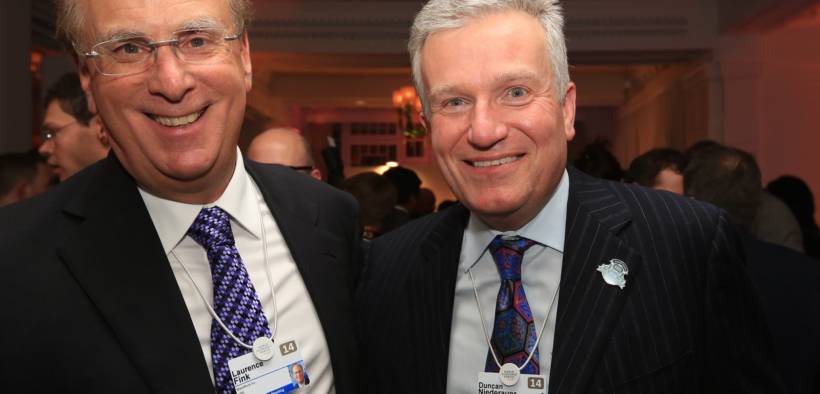Blackrock CEO Admits Climate Change Will Create ‘A Fundamental Reshaping Of Finance’

“BlackRock beginning its shift of capital out of fossil fuels, including today’s divestment of coal in its actively managed funds, is a fantastic start…”
BlackRock CEO Larry Fink, the head of the world’s largest asset manager with approximately $7 trillion managed on behalf of investors, announced on Tuesday that his firm will now make climate change central to its investment decisions.
The executive said that BlackRock will now hold stricter demands on the companies the firm invests in, requiring them to disclose climate-related risks and plans to abide by Paris Agreement goals. Fink cited not only environmental damage as guiding his decision, but also his belief that climate change will reshape finance.
“Climate change has become a defining factor in companies’ long-term prospects … But awareness is rapidly changing, and I believe we are on the edge of a fundamental reshaping of finance.”
“Climate change is almost invariably the top issue that clients around the world raise with BlackRock. From Europe to Australia, South America to China, Florida to Oregon, investors are asking how they should modify their portfolios,” Fink continued. “And because capital markets pull future risk forward, we will see changes in capital allocation more quickly than we see changes to the climate itself.”
“In the near future — and sooner than most anticipate — there will be a significant reallocation of capital,” he added.
Climate change has recently made headlines through the record-breaking Australian bushfire which has killed over two dozen, destroyed thousands of properties, and is estimated to have killed more than a billion animals. Ocean temperatures were also reported to have hit a record high this week.
American Prospect editor David Dayen welcomed Fink’s announcement, having argued that the biggest threat to the global financial system is climate change.
“Climate change–induced extreme weather events (hurricanes, fires, flooding, etc.) can stress insured assets along coastlines, from mortgaged homes and commercial real estate, to small businesses and farms that borrow money,” wrote Dayen in November. “This is particularly threatening to insurers.”
Dayen notes that at least 16 insurance companies failed after Hurricane Andrew devastated Florida in 1992, an example the financial system’s vulnerability to climate change.
This is the most important story of the day. I don't trust BlackRock but this is in response to significant pressure from grassroots groups. https://t.co/668hggdB0c
— David Dayen (@ddayen) January 14, 2020
Another reason Dayen argues regulators and private financiers should immediately begin adapting the financial system is because top financial firms are heavily invested in carbon, which would sharply lower the value of their carbon-sensitive assets, which are estimated to be worth trillions.
“If Congress supports a firm transition away from fossil fuels, or if a technological advance makes renewables radically cheaper and easily deployable, financial firms, insurers, and investors with carbon-sensitive assets could abruptly be stuck with worthless investments,” wrote Dayen.
However, some critics were less impressed by BlackRock’s statement, pointing to Fink’s lack of meaningful action so far.
He is one of the world’s largest managers of fossil fuel stocks. https://t.co/VTxqBevKJe
— Anand Giridharadas (@AnandWrites) January 14, 2020
As the Intercept reported in August, Blackstone has provided “significant financing to the world’s biggest meatpacker, JBS, which has been caught year after year buying cattle raised on illegally deforested Amazon land,” helping to drive Amazon deforestation.
And as Citizen Truth previously wrote, Fink’s principled stances appear to waiver easily, as the executive made a big deal out of refusing to attend Saudi Arabia’s Future Investment Initiative, also known as Davos in the Desert in 2018, in protest to the execution of journalist Jamal Khashoggi, but returned a year later. Fink was also honored by the International Rescue Committee with the charity’s Humanitarian Award for his supposedly principled stance.
Fink was back at Davos in the Desert in 2019 in anticipation of Saudi Aramco’s record-breaking IPO, another example of how financiers who publicly call for action on climate change invest massively in fossil fuels.
“The greed of Goldman Sachs, JPMorgan, Citigroup and BlackRock is insatiable,” tweeted Senator Bernie Sanders in September. “Who cares if the Saudis are starving millions of Yemeni civilians or that our planet faces a climate emergency? Profiting off of $1.5 trillion in Saudi oil is just too important.”
Despite Fink’s actions, many activists view the CEO’s announcement is a positive step forward.
“BlackRock’s new initiatives match the size of the crisis we’re seeing in 2020 and are the direct result of an outpouring of pressure from the global climate movement,” Sunrise Project senior strategist Diana Best said in a statement. “BlackRock beginning its shift of capital out of fossil fuels, including today’s divestment of coal in its actively managed funds, is a fantastic start and instantly raises the bar for competitors such as Vanguard and State Street Global Advisors.”













